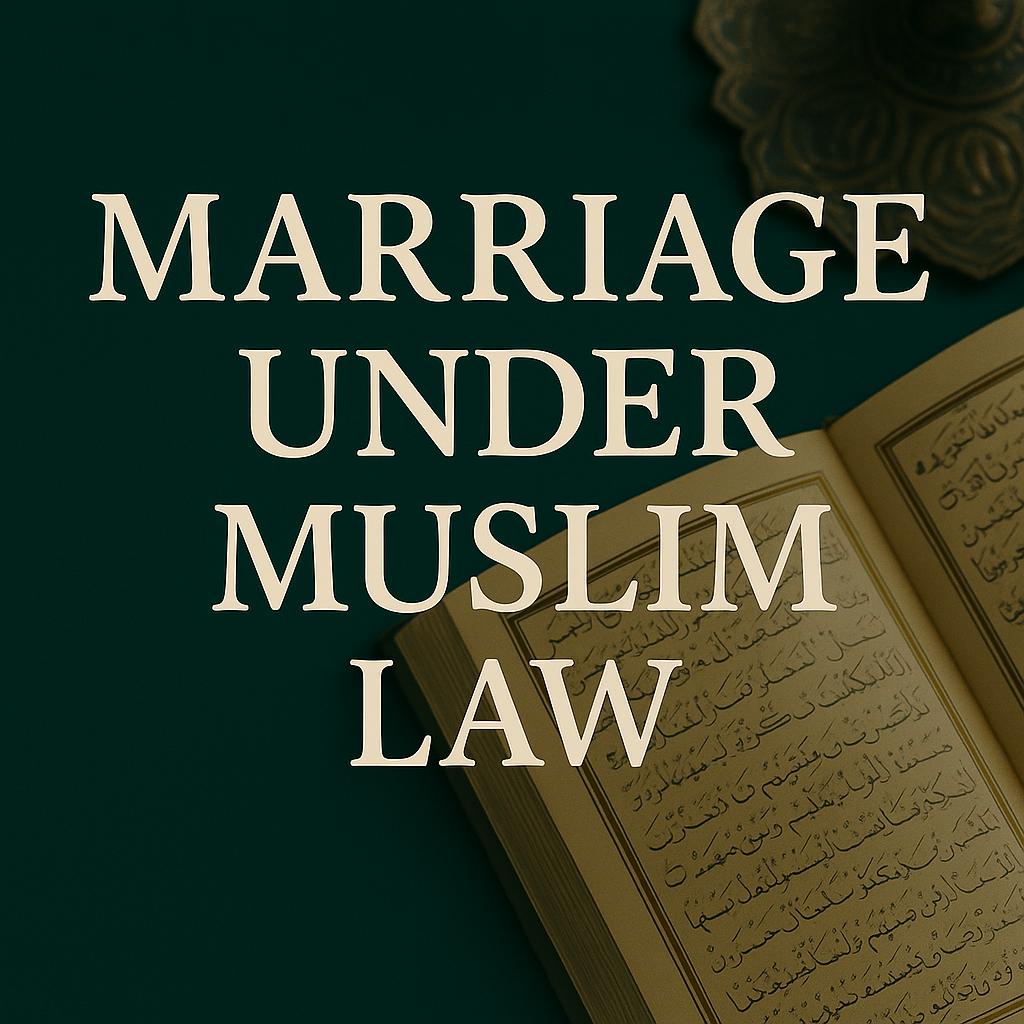 Muslim Marriage under Muslim Law: Nature, Essentials & Legal Implications
Muslim Marriage under Muslim Law: Nature, Essentials & Legal Implications
Meaning and Nature of Muslim Marriage
The Arabic word “Nikah” literally means union of sexes, but in law, it refers to marriage.
According to Baillie’s Digest, marriage is “a contract for the purpose of legalising sexual intercourse and procreation of children.”
As per Ameer Ali, it is an institution for the protection of society and a shield against unlawful desires.
Abdur Rahim describes Muslim marriage as having both the nature of ‘Ibadat (devotion) and Muamalat (dealings).
In the landmark case Abdul Kadir v. Salima (1886), Justice Mahmood observed:
“Marriage among Muhammadans is not a sacrament but purely a civil contract.”
Yet, Prophetic traditions (Ahadith) add a spiritual dimension:
• “He who marries completes half of his religion.”
• “Three persons Allah helps: one who marries to safeguard chastity…”
Thus, while contractual in form, Muslim marriage also has religious value.
Essentials of a Valid Muslim Marriage
1. Proposal (Ijab) and Acceptance (Qubul) must be made in one sitting.
2. Both parties must be sane, adult (baligh) and capable of contracting.
3. Free consent of the parties is essential.
4. In Sunni law, two male or one male and two female witnesses must be present.
5. No religious rituals or written documentation are mandatory, though Kabinama (marriage deed) is often used.
Capacity for Marriage
• Puberty (usually presumed at 15 years) marks the age of majority in Muslim law.
• Governed by personal law, not the Indian Majority Act, 1875.
• However, the Prohibition of Child Marriage Act, 2006 applies—marriage under 18 (girls) and 21 (boys) is voidable, not void.
Option of Puberty (Khyar-ul-Bulugh)
A minor married by a guardian can repudiate the marriage upon reaching puberty if:
• Marriage occurred before 15,
• Repudiation is done before 18,
• Marriage is not consummated.
This right is protected under the Dissolution of Muslim Marriage Act, 1939.
Legal Effects of Valid Marriage
1. Sexual intercourse becomes lawful
2. Children are legitimate
3. Wife entitled to dower (mahr) and maintenance
4. Husband gains right to restrain wife’s movement reasonably
5. Mutual inheritance rights arise
6. Iddat becomes mandatory upon divorce/death
7. Any agreements in the Kabinama are enforceable
8. No right in each other’s property
9. Marriage gives rise to affinity prohibitions
Types of Muslim Marriages
Sunni Law
• Valid (Sahih) – fulfills all legal conditions
• Void (Batil) – prohibited by consanguinity, affinity, or fosterage
• Irregular (Fasid) – temporary bars like no witnesses, interfaith, during iddat, etc.
Shia Law
• Marriage is either Valid or Void; no category of “irregular”.
Prohibited Marriages
A. Absolutely Prohibited (Void/Batil)
• Blood relations (e.g. mother, sister)
• Affinal relations (e.g. wife’s daughter)
• Foster relations (e.g. foster-sister)
B. Relatively Prohibited (Irregular/Fasid)
• Polygamy exceeding 4 wives
• Marrying a woman in iddat
• Marrying without witnesses (Sunni law)
• Interfaith marriages (Muslim woman with non-Muslim is void; Muslim man with non-Kitabia is irregular)
C. Prohibitory Incapacity
• Polyandry (woman marrying second time while first husband lives)
• Marriage of Muslim woman with non-Muslim man
• Marriage of minor without guardian’s authority
D. Directory Incapacity
• Marrying pregnant woman by another man
• Marriage during pilgrimage (Ihram state)
• Marriage with a terminally ill person
Legal Conditions in Marriage (Kabinama)
Valid Conditions:
• Husband to maintain wife
• Prevent second marriage
• Fix place of residence
• Delay consummation
• Stipulation for divorce on misconduct
Illegal Conditions:
• Wife living permanently with parents
• Pre-agreement for divorce
• Binding husband not to divorce
• Denial of inheritance rights or maintenance
Guardianship (Jabr)
Under Sunni law, marriage of a minor can be contracted by:
1. Father
2. Grandfather
3. Male relatives
4. Mother
5. Maternal relatives
6. State
Under Shia law, only father and grandfather can act as guardians.
Conclusion:
Muslim marriage is more than a civil contract. It is a legal, social, and spiritual bond governed by both Shariah and personal law statutes in India. While it contains contractual elements, its religious essence cannot be denied.
Start Your Preparation with TOA
At Theory of Abrogation, we equip you with everything you need:
•Subject-wise expert classes
•Mock test series
•Legal current affairs
•Personalized mentorship for interview preparation
“Your law degree is your foundation, but your preparation is what will build your success.”
Join Our New Batch Now!
Prepare smart. Prepare with Theory of Abrogation.
Contact Us:
📍 B-109, Commercial
Complex Dr. Mukherjee
Nagar, Delhi-09
📞 +91 9971399324 | +91 8840961324
📧[email protected]
